Unknown Assassins Target Iranian Kurdish Lawyer In Iraq
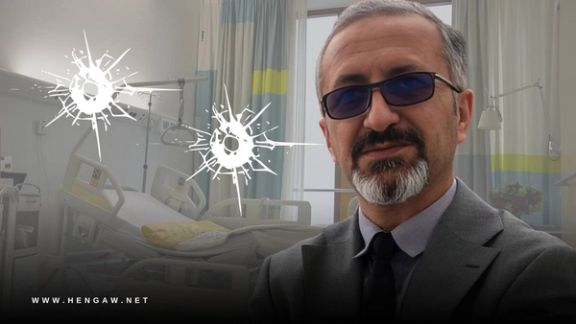
According to reports received by Iran International, Sohrab Rahmati, an Iranian Kurdish lawyer and human rights defender is currently hospitalized under security measures in Erbil.

According to reports received by Iran International, Sohrab Rahmati, an Iranian Kurdish lawyer and human rights defender is currently hospitalized under security measures in Erbil.
Informed sources in the Kurdistan region of Iraq told Iran International's reporter that Rahmati was targeted in front of his house in Erbil by a three-member armed team, and he was hit by two bullets. The security forces of the Kurdistan region of Iraq have not yet been able to arrest the attackers and are investigating the incident.
Rahmati has represented several families in recent years whose members were victims of assassinations orchestrated by agents of the Islamic Republic of Iran in the Kurdistan Region.
According to information received by Iran International in previous years, he had been responsible for handling the case of Qadir Qadiri, a senior member of the Kurdistan Democratic Party of Iran, who was assassinated in a village in Sulaymaniyah province by three agents of the Islamic Republic in March 2018.
In an exclusive interview with Iran International in 2020, Rahmati said, "Those accused of Qadiri's assassination have confessed that the Islamic Revolutionary Guard planned the assassination and promised to pay them."
The Kurdistan Democratic Party of Iran condemned the malicious intent towards the life of this lawyer in a statement and announced that Sohrab Rahmati had been responsible for important cases.
The Democratic Party also emphasized that this lawyer has been repeatedly targeted for assassination by the Islamic Republic. In the past 11 months alone, three members of the Kurdistan Democratic Party of Iran have been assassinated in the Kurdistan region of Iraq by the Islamic Republic.
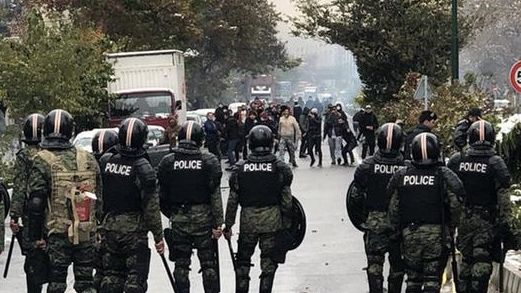
Candles, vigils, sobbing and lamenting mothers, and offerings of traditional food and snacks at cemeteries on colorful tablecloths are common scenes in Iran this week.
Families of victims and ordinary people mark the 4th anniversary of the killing of at least 1,500 mostly young protesters in less than five days in November 2019.
Photos of fallen protesters are circulating widely on social media, with users posting collages of hundreds of images of young men and women who lost their lives in one of Iran's bloodiest crackdowns on dissent under the Islamic rule.
Days of intense nationwide protests, triggered by a sudden government decision to raise fuel prices, started on November 14, 2019, and marked the beginning of prolonged periods of dissent. What made the people angry was not simply a price rise. It was the painful humiliation they felt as the government did not bother to let them know in advance about the hike. In addition, when the media reported about a possible price rise, government officials denied any such plans.
The announcement came at midnight, presumably to minimize public shock. However, the morning revealed an even greater shock, as prices had tripled overnight. Iranians, anticipating a ripple effect on other prices, took to the streets in unprecedented numbers.
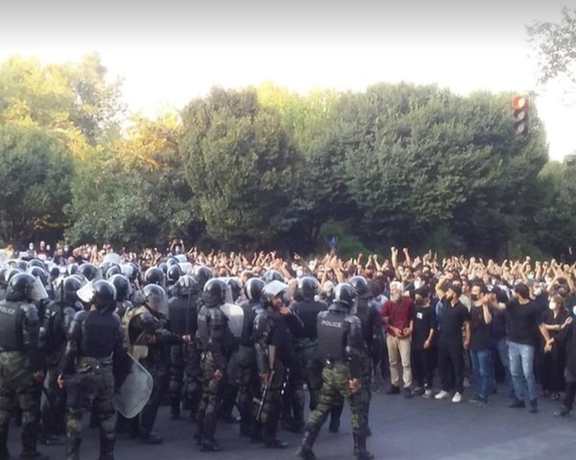
As many, including Iranian journalist Shahed Alvai have observed, "the crackdown was even more unprecedented. Protests took place in 104 Iranian cities in 29 provinces, and they were quickly turned into a massive anti-regime movement. Protesters ruled out reconciliation with the government and took to the streets in a scale that terrified the government."
The Revolutionary Guard’s paramilitary forces, the Basij, that was deployed to suppress the demonstrations labeled the 2019 protests as "An all-out war against the regime and the Islamic revolution." The regime's response was ruthless massacre, a method it continued to employ in subsequent nationwide protests, including those sparked by public anger with the Morality Police, after the death of 22-year-old Mahsa Amini after her arrest for “improper hijab” in September 2022.
During the 2019 protests in the month of Aban on the Iranian calendar (October 22 to November 21), protesters, for the first time, chanted slogans against the entire regime: "We do not want the reformists and conservatives. That is all over!" They were referring to two insider factions ruling Iran for three decades. The government recognized the severity of the threat, leading to a violent crackdown on dissent, and in the words of Iranian dissidents, "Aban continued."
Four years later, references to Aban are abundant. People are still remembering and mourning the fallen protesters who were often shot at point blank range as documented by International human rights organizations. The victims' families are still being harassed by security forces and sometimes imprisoned for several years.
In subsequent protests, the government, mindful of the international backlash to the large number of protester deaths, took pride in claiming fewer casualties in 2022. However, shotguns replaced rifles, resulting in many being wounded or blinded, and a higher number ended up in jail.
What the ruling elite did not learn was addressing the root cause of dissent: Deteriorating economic conditions in 2019 and serious political issues including demands for civil liberties and respect for human rights in 2022. Only after the nationwide protests in 2022 did government officials express a willingness to engage in dialogue with the people. However, once the streets calmed, they abandoned the call for reconciliation, adopting a rude and humiliating tone toward Iranians, particularly women, teachers, university professors, workers, and pensioners, on a daily basis.
Reformist commentator Abbas Abdi reminded the government in a commentary in Etemad newspaper that, during the 2022 protests, they used to be humble and call for dialogue with protesters. However, as soon as they believed the protests were behind them, they returned to their factory settings, speaking arrogantly.
According to Abdi, authorities interviewed 66 scholars, including himself, to understand the events and reasons behind the protests. However, he criticized the government's reluctance, stating, “As far as they are concerned, there was a security problem, and the security forces sorted it out." Abdi acknowledged that "The way the government is handling last year's protests has not changed."
Despite government assertions, numerous social media posts by political activists, often writing under an alias, insist that the Bloody Aban is not over. As Alavi pointed out, "The names, memories, and pictures of Aban 2019 live on as family members of fallen protesters keep them alive. Eyewitnesses are in prisons, and family members have not stopped seeking justice." Mahboubeh Ramezani, the mother of Pejman Gholipour, one of the young men killed in November 2019, has told the government: "You know that Aban has destroyed you and that Aban still goes on."
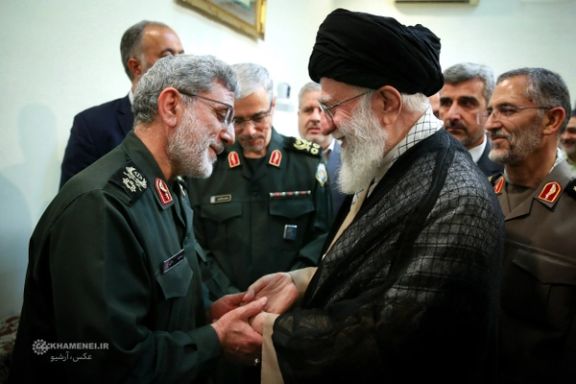
The commander of Iran's Revolutionary Guard extraterritorial Quds force says the ‘resistance front’ headed by Tehran supports Hamas militants in their conflict with Israel.
“In support of the Axis of Resistance, we will undertake all necessary measures during this historic battle.” Esmail Qaani told the commanders of the Tehran-backed groups on Thursday, Iran's semi-official Tasnim news agency reported.
"Resistance Axis" refers to an alliance of Iran-backed armed groups in the Middle East controlled by the Quds Force, that oversees financial and military support to Tehran’s proxies in Iraq, Syria, Lebanon, Yemen and elsewhere.
It appears that while Iran's leadership and diplomatic apparatus attempt to maintain a distance from the ongoing war, hardliners such as IRGC commanders continue to push the boundaries.
Supreme Leader Ali Khamenei has publicly endorsed Hamas ideology to destroy Israel and has made statements that can be interpreted as signals to proxy groups in the region, to attack Israeli ships and other targets, while rejecting any responsibility for such attacks. The same tactic has been used regarding attacks on US forces in the region.
Additionally, the Iranian Foreign Minister, Hossein Amir-Abdollahian, addressed the ongoing conflict between Israel and Hamas during an interview with CBS on Wednesday, stating, "We did not want this crisis to escalate."
The ongoing war began with Hamas fighters rampaging into Israel on October 7, killing more than 1,200 people and taking at least 240 hostages.
The United States has also warned Iran not to escalate the conflict in the region.
As reported by Reuters, US President Joe Biden urged Chinese President Xi Jinping on Wednesday to dissuade Iran from taking provocative steps that might aggravate the war.
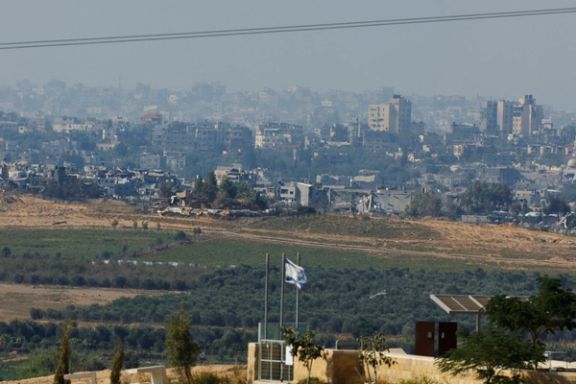
Iran International, the 24-hour news television channel broadcasting to Iran on satellite, was given entry into Gaza as the first Persian-language media.
The Israeli army permitted Iran International to visit Gaza and report on the developments of the Israel-Hamas war. The Israel Defense Forces (IDF) say that they have gained control over Gaza, but our correspondent heard sounds of gunfire, with Hamas forces said to be attacking from underground tunnels.
The Iran International news team entered Gaza in an Israeli military vehicle from the vicinity of a Kibbutz in southwestern Israel, which had witnessed the terror attack by Hamas on October 7th. This is the same route that Hamas militants used to enter the Kibbutz (Erez) and terrorize Israeli civilians.
Along the way, Israeli-plated vehicles, brought to Gaza by Hamas forces, can still be seen on the side of the road, the Iran International team reported. A black smoke covers the distance of Gaza city, and the sound of explosions continues incessantly.
An Israeli soldier told Iran International that although Gaza City is under the control of the army, the clearing operation is still ongoing, and sometimes Hamas militants open fire towards Israeli soldiers from their underground tunnels.
According to an Iran International correspondent, tens of thousands of residents from northern Gaza are moving towards the south of the Strip carrying white flags. Israeli forces are monitoring evacuations to prevent Hamas militants from stopping the process.
The report says that the extent of the war's devastation in northern Gaza is so severe that there is no place for life in this area, and it can be said that Gaza City has been destroyed.
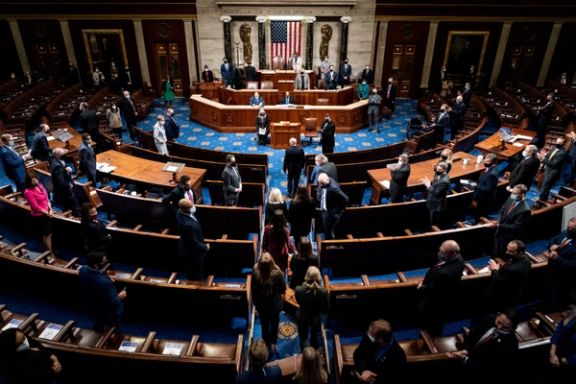
US lawmakers are introducing several measures to compel the Biden administration to adopt a more assertive stance towards Iran, including the possibility of a direct attack on Iranian soil.
Many in the Congress are dismayed by a new US sanction waiver that would see Iran gaining access to another $10 billion frozen in Iraq, while openly backing Hamas and celebrating its attack on Israel last month.
“We are in a day and age where we need to be aggressive with Iran,” Senator Joni Ernst told Iran International’s Arash Alaei. “If you look at what is going on in the Middle East right now, we see Iran sponsoring terrorism through Hezbollah, Hamas and the Palestinian Islamic Jihad.”
Senator Ernst is co-sponsoring a bill with Senator Richard Blumenthal that aims to enforce Iran’s oil sanctions –abandoned by the Biden administration in all but name.
The bipartisan bill includes a provision for a $150 million sanctions enforcement fund that would allow the Department of Homeland Security Investigations office to focus on enforcing Iranian oil sanctions.
“We need to start interdicting Iranian oil and use the funds for victims of state-sponsored terrorism”, Senator Ernst told Iran International.
Another initiative, introduced by Senators Lindsey Graham and Richard Blumenthal urges President Biden to attack Iran in case an American soldier was killed in Syria or Iraq.
“If an American is killed… then the target should be in Iran,” said Senator Graham at the press briefing introducing the initiative. “We’ve had four strikes, all inside Syria… Reagan hit Iran. Trump hit Iran… they need to pay a price they haven’t paid yet.”
And he explained the “price” in the clearest terms.
“That price should be the IRGC infrastructure… and the oil refineries should be knocked out if they continue their efforts to expand this war [between Israel and Hamas].”
Senators Graham and Blumenthal say that their draft is such that it would require no further Congressional authorization and President Joe Biden can take action at will.
“And the Iranians will get it,” Senator Blumenthal said at the same briefing. “And hopefully they’ll get it today, even before it’s passed, that we stand behind the President. We don’t want war. They shouldn’t want war.”
Iran and the US have been on a colliding course for a few weeks now, but so far have avoided direct conflict. The Islamic Republic utilizes its proxies in Iraq and Syria, as well as Houthis in Yemen and Hezbollah in Lebanon to attack US and Israeli targets. The United States, on the other hand, has retaliated by striking at IRGC affiliated facilities in Syria.
Senator Graham called for a direct and clear warning to be issued to Iran.
“So if you continue [the attacks], this is what’s coming your way,” he said, “we’re going to hit you hard in every sphere of influence, economic and military. We are on the edge right now. The Iranians can make some decision one way or the other. Choose wisely.”
Despite their persistence on shifting the Biden administration's approach towards Iran, the US lawmakers are not too optimistic about their chances.
Senator Ernst told Iran International that she felt Biden was not likely to enforce the bill even if it reached the final stage and was signed into law.
“I don't count much on the Biden administration,” she said, “I'm hopeful that in the next few years, we have a different leader that will be willing to enforce the sanctions.”
Many believe that the Biden administration has chosen to look the other way and allow Iran to export its oil in spite of the sanctions –hoping that in return, it would get the regime to agree to some kind of nuclear deal.
On Wednesday, a White House Energy Adviser Amos Hochstein said that the US will toughen up on Iran oil sanctions to curb the Islamic Republic’s revenues.
“We are going to enforce the sanctions,” he said, “those numbers will come down.”
Iran reportedly exported 1.4 million barrels of oil per day last month. This is almost twice as much as it averaged during Trump’s “maximum pressure” campaign, according to United Against Nuclear Iran.
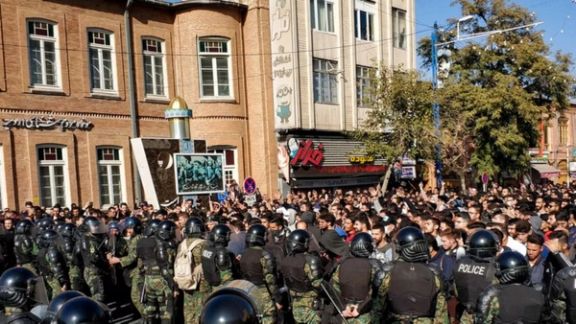
Families of Iranians killed during the nationwide protests of the past year and those of November 2019, vowed to continue their uprising against the Islamic Republic.
In a joint statement, accompanied by the hashtag "November Continues,” they expressed their determination on social media, declaring “We, as families seeking justice, announce that, at the risk of our lives, we will continue the path of November against the Islamic Republic."
The 2019 protests, often referred to as Bloody November, initially erupted due to a significant increase in fuel prices, quickly transforming into demands for government overthrow and opposition to Supreme Leader Ali Khamenei.
According to a rights group report, the Islamic Republic security forces allegedly killed at least 3,000 protesters from November 15 to 17, with nearly 20,000 arrests. Reuters, at the time, reported 1,500 deaths.
Recent reports from rights groups also shed light on the aftermath of protests sparked by the 2022 death of Mahsa Amini in custody, indicating that over 500 people, including minors, lost their lives, thousands were injured, and 22,000 were arrested.
The Islamic Republic's response to the protests has included several death sentences for demonstrators, with seven of them already executed.
The Iranian judiciary claims the verdicts were issued by a fair trial, but details were not disclosed. The government often restricts defendants from choosing their legal representation, and due process is frequently absent in similar cases.